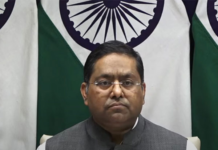New Delhi: The New Education Policy (NEP), which is being brought after 33 years will be true representative of Indian culture and values gelling with the needs of 21st century, Union Human Resource Development Minister Ramesh Pokhriyal ‘Nishank’ has said, adding the the Policy will come in effect soon.
 The NEP will give right direction to the youth, Pokhriyal said while laying the foundation stone of the new integrated campus of CBSE at Dwarka, on Friday. He further said that the draft NEP was prepared after long deliberation, suggestions and comments received from general public and its stakeholders.
The NEP will give right direction to the youth, Pokhriyal said while laying the foundation stone of the new integrated campus of CBSE at Dwarka, on Friday. He further said that the draft NEP was prepared after long deliberation, suggestions and comments received from general public and its stakeholders.
Draft National Education Policy 2019 aims to universalise the pre-primary education by 2025 and provide foundational literacy/numeracy for all by 2025. The Draft National Education Policy, 2019 is out in the public domain. Drawing inputs from the T.S.R. Subramanian Committee report and the Ministry of Human Resource Development (MHRD), the K. Kasturirangan Committee has produced the policy document.
Pokhriyal said India was a young country and CBSE could play a crucial role to nurture and guide the children to lead the world again.
While addressing the gathering the HRD Minister said, “As per the vision of our Prime Minister to save the environment, MHRD is discouraging the use of single use plastic in the Ministry as well as its affiliated organisations and autonomous bodies”.
The Ministry has also been running One Student – One Tree campaign to increase green cover of the country and save one litre of water daily to preserve water resources for future generations and students were participating enthusiastically in these campaigns, he said.
Present on the occasion was CBSE Chairperson Anita Karwal and other senior officials.
The new integrated campus of CBSE at Dwarka will be a state-of-the-art building while fulfilling the green building norms.
The Minister said, ” The new building must not be merely a building of concrete but a centre of vision for betterment of education which should be reflected through this building”.
The 12,000 sqm building was estimated to be completed in two years time.
The complex would include installation of efficient building management system that would facilitate energy conservation. Solar panels would be installed on the roof of the building that would produce 300 KWH of electricity.
Moreover, a sewage treatment plan had also been proposed for flushing in toilets and reuse of gray water in landscaping. These facilities being included in the integrated campus would also contribute towards environmental protection. Besides, latest security features have been taken care of in the design of the building.
In order to maintain better coordination among various branches and units of the Board in Delhi and to meet the increasing challenges due to increase in number of CBSE affiliated schools, the Board had earlier proposed to create an integrated office complex in Delhi and for this purpose, a plot of three acres was purchased from the Delhi Development Authority (DDA) at Sector-23, Dwarka in the National capital.
Apart from providing diverse types of training to the teachers and principals of its affiliated schools through functioning centers of excellence, the Board has established 16 Regional Offices at Ajmer, Allahabad, Bengaluru, Bhopal, Bhubaneswar, Chandigarh, Chennai, Delhi East, Delhi West, Dehradun, Guwahati, Noida, Patna, Panchkula, Pune and Thiruvananthapuram.
Besides, the headquarters in Delhi, the CBSE has a vocational examination unit at Preet Vihar, Academic and Skills Education Unit at Rouse Avenue and Regional Office and CTET Unit at Patparganj, Delhi.











